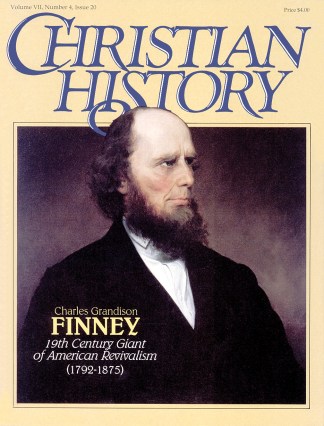Though Finney was in the New England Calvinist tradition, he increasingly took positions considered Arminian. In this excerpt from the Oberlin Evangelist of 1840 Finney argues that Christians can fall from grace (i.e., lose their salvation); this was a direct contradiction of the Calvinist teaching of eternal security. Finney took certain statements of the apostle Paul to teach this, though those statements were traditionally considered statements about falling from obedience to the Lord. His stand on this added to the controversy surrounding his perfectionist ideas. Point 2 below has been a cause of confusion, for Finney seems to say that Christians do not receive new natures upon conversion—something the New Testament seems to clearly teach (e.g., in 2 Cor 5:17). Some have said that Finney seriously deviated from historical Protestant teaching; the statement has even been attributed to an unfortunate mental slip or confused thinking on Finney’s part. Whatever the explanation, it is one of Finney’s more controversial statements on 1 Corinthians 10:12 “Let him that thinks he stands take heed lest he fall.”
This confidence, whatever may be its foundation, cannot of itself secure the soul against falling into sin and hell.
1. Because, if it is founded in anything naturally good in us, it is ill-founded, of course.
2. If it is founded in what grace has already done for us, it is ill-founded; for however much grace may have done, it has not changed our nature. Our constitutional susceptibilities remain the same. It has not so changed our relations and circumstances as to exempt us from temptation; and consequently, nothing that grace has done, or ever will do for us, can render our perseverance in holiness unconditionally certain.
3. If this confidence is based upon our purposed watchfulness, prayerfulness, experience, or faith; these, independent of the sovereign grace of God, afford no foundation for our confidence, as to render it at all certain, or even probable, that we shall not sin again.
4. If this confidence is based upon the promises of God, it will not render our perseverance unconditionally certain; because the promises of God are all conditioned upon our faith, and the right exercise of our own agency ….
5. Any confidence in the promises of God, either for sanctification or final salvation, that does not recognize this universal principle in the government of God, is ill-founded and vain; because God has revealed this as a universal principle of his government; and whether expressed or not, in connection with each promise, it is always implied.
Copyright © 1988 by the author or Christianity Today/Christian History magazine. Click here for reprint information on Christian History.










